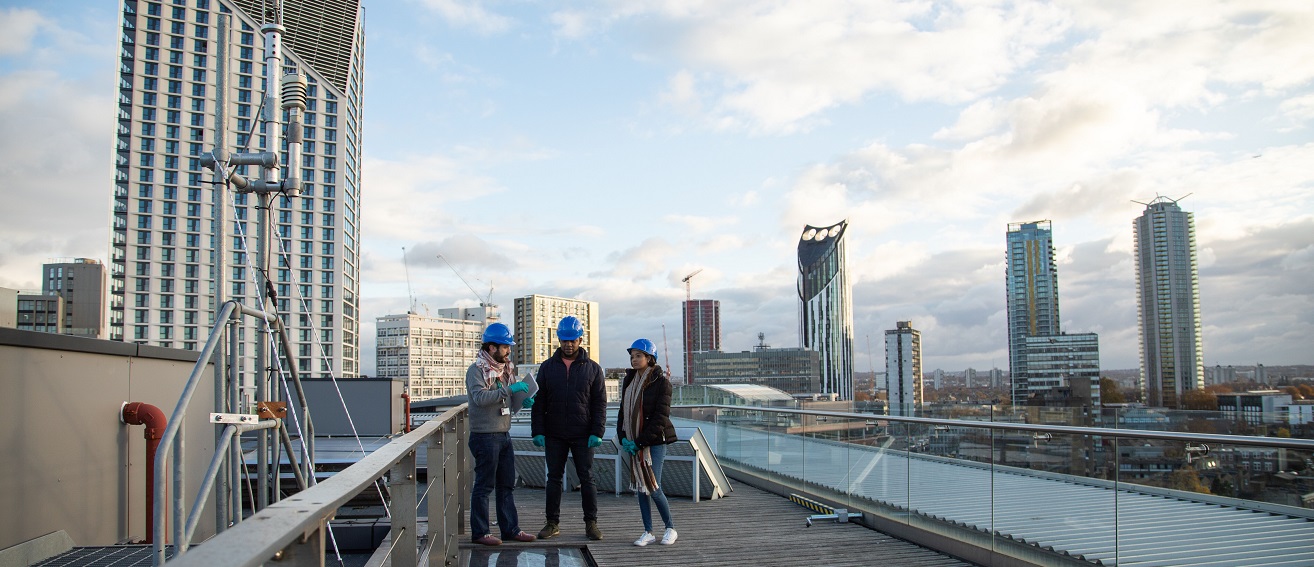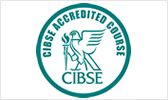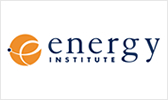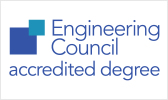Overview
60 years of expertise
Did you know more than half the graduates working in the building services engineering field in the UK have been educated at LSBU? With more than 60 years of expertise in this area, our course is designed to equip you with the technical know-how and communication and management skills to be an effective leader in this specialist sector.
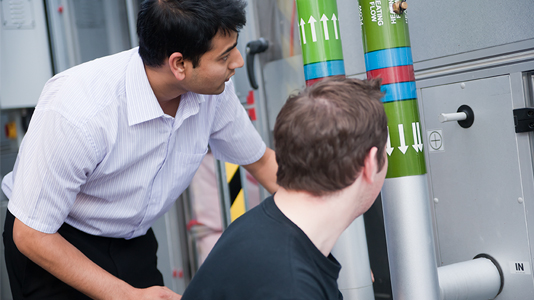 |  |  |
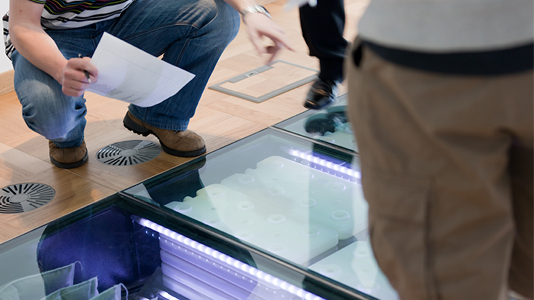 | 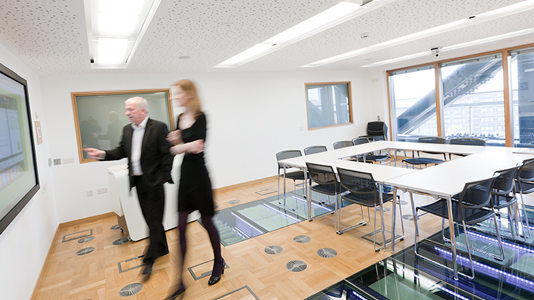 | 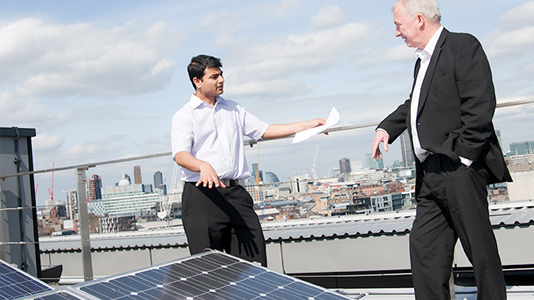 |
Building services engineering covers the design, installation, operation and maintenance of all the things that make a building safe, comfortable, energy efficient and functional. It’s always in demand and set to grow as buildings’ designs evolve to become more sustainable.
BEng (Hons) Building Services Engineering is designed to equip you with the technical, management and communication skills needed to be an effective leader of teams involved in the design of building services and energy conservation in buildings. This course is accredited by the Chartered Institution of Building Services Engineers (CIBSE) and the Energy Institute as meeting the requirements for Incorporated Engineer status.
Why study Building Services Engineering at LSBU?
- grad
- 94% of students on this programme said that students' union represent students' academic interests well (National Student Survey 2023)
- university
- Heritage: we have been running courses for the Building Services Engineering industry since 1947.
- check-circle
- Professional accreditation: accredited by CIBSE and the IoE as meeting the academic requirements of Incorporated Engineer status.
- space-shuttle
- 2nd in London for graduate prospects in Times University Guide 2022)
- random
- Study modes to suit you: study full-time or part-time one day a week.
- puzzle piece
- Employability: you'll have the option to undertake a work placement in your third year.
- graduation-cap
- 1st among London moderns for research intensity in Complete University Guide 2022)
- heartbeat
- Ranked 2nd for course satisfaction in Engineering: Civil amongst London Competitors (Guardian University Guide 2021).
- fa fa-users
- From AI machine learning boot camp to silent film processing, there is a range of extracurricular activities for Engineering students to get involved in.
| ModePart-time | Duration4.5 years | Start dateSeptember | Application code2090 | Application method Direct to LSBU |
| ModeFull-time | Duration3 years | Start dateSeptember | Application codeK2J9 | Application method UCAS |
| ModeSandwich | Duration4 years | Start dateSeptember | Application codeK2J9 | Application method UCAS |
| ModePart-time (Year 2 entry) | Duration3.5 years | Start dateSeptember | Application code5304 | Application method Direct to LSBU |
Location
London South Bank University student union is located at 103 Borough Rd, London SE1 0AA.
If you are visiting our Southwark Campus, you may wish to use our downloadable campus map (PNG File 466 KB). For information on accessibility, see our DisabledGo access guides. See our location page for more details.
Entry Level Requirements
Want to start your course this September? call 0800 923 8888 for entry requirements.
- 112 UCAS points, with subjects including Maths or Physical Sciences. Visit UCAS for guidance on the tariff.
- GCSE Maths grade C or above or equivalent (reformed GCSEs grade 4 or above).
- If you do not meet the entry criteria above we also review any previous skills, knowledge or experience you have gained outside of your education and are happy to talk through any extenuating circumstances you feel relevant.
Choose your country
Select country here:
Missing English and Maths qualifications?
If you do not have the required English and Maths qualifications needed to satisfy the entry requirements for this programme, we have courses available at our partner College that you can take to upskill in these areas. Find out more at South Bank College.
Advanced entry
If you have already completed some studies at another university, we may be able to consider you for advanced entry. Please see our advanced entry page for more information.
United Kingdom
£9535
Tuition fees for home students
International
£15500
Tuition fees for international students
Tuition fees are subject to annual inflationary increases. Find out more about tuition fees for Undergraduate or Postgraduate courses.
-
Part-time
part-time
BEng (Hons) Building Services Engineering (PT) - Year 1
UK fee: £5721 International fee: £9300 AOS/LSBU code: 2090 Session code: 1PS00 Total course fee: * The full amount is subject to fee increases, the total shown below is based on current fees.
UK: £28605 International: £46500 BEng (Hons) Building Services Engineering (DIRECT ENTRY) (PT) - Year 1
UK fee: £6356.67 International fee: £10333.33 AOS/LSBU code: 5304 Session code: 1PS00 Total course fee: * The full amount is subject to fee increases, the total shown below is based on current fees.
UK: £22248.34 International: £36166.66 BEng (Hons) Building Services Engineering (PT) - Year 2
UK fee: £5721 International fee: £9300 AOS/LSBU code: 2090 Session code: 2PS00 Total course fee: * The full amount is subject to fee increases, the total shown below is based on current fees.
UK: £28605 International: £46500 BEng (Hons) Building Services Engineering (DIRECT ENTRY) (PT) - Year 2
UK fee: £6356.67 International fee: £10333.33 AOS/LSBU code: 5304 Session code: 2PS00 Total course fee: * The full amount is subject to fee increases, the total shown below is based on current fees.
UK: £22248.34 International: £36166.66 BEng (Hons) Building Services Engineering (PT) - Year 3
UK fee: £5721 International fee: £9300 AOS/LSBU code: 2090 Session code: 3PS00 Total course fee: * The full amount is subject to fee increases, the total shown below is based on current fees.
UK: £28605 International: £46500 BEng (Hons) Building Services Engineering (DIRECT ENTRY) (PT) - Year 3
UK fee: £6356.67 International fee: £10333.33 AOS/LSBU code: 5304 Session code: 3PS00 Total course fee: * The full amount is subject to fee increases, the total shown below is based on current fees.
UK: £22248.34 International: £36166.66 BEng (Hons) Building Services Engineering (PT) - Year 4
UK fee: £5721 International fee: £9300 AOS/LSBU code: 2090 Session code: 4PS00 Total course fee: * The full amount is subject to fee increases, the total shown below is based on current fees.
UK: £28605 International: £46500 BEng (Hons) Building Services Engineering (DIRECT ENTRY) (PT) - Year 4
UK fee: £3178.33 International fee: £5166.67 AOS/LSBU code: 5304 Session code: 4PS00 Total course fee: * The full amount is subject to fee increases, the total shown below is based on current fees.
UK: £22248.34 International: £36166.66 BEng (Hons) Building Services Engineering (PT) - Year 5
UK fee: £5721 International fee: £9300 AOS/LSBU code: 2090 Session code: 5PS00 Total course fee: * The full amount is subject to fee increases, the total shown below is based on current fees.
UK: £28605 International: £46500 -
Full-time
full-time
BEng (Hons) Building Services Engineering (FT) - Year 1
UK fee: £9535 International fee: £15500 AOS/LSBU code: 2072 Session code: 1FS00 Total course fee: * The full amount is subject to fee increases, the total shown below is based on current fees.
UK (excluding any optional years): £28605 UK (including any optional years): £28605 International (excluding any optional years): £46500 International (including any optional years): £46500 BEng (Hons) Building Services Engineering (FT) - Year 2
UK fee: £9535 International fee: £15500 AOS/LSBU code: 2072 Session code: 2FS00 Total course fee: * The full amount is subject to fee increases, the total shown below is based on current fees.
UK (excluding any optional years): £28605 UK (including any optional years): £28605 International (excluding any optional years): £46500 International (including any optional years): £46500 BEng (Hons) Building Services Engineering (FT) - Year 3
UK fee: £0 International fee: £0 AOS/LSBU code: 2072 Session code: 3FS00 Total course fee: * The full amount is subject to fee increases, the total shown below is based on current fees.
UK (excluding any optional years): £28605 UK (including any optional years): £28605 International (excluding any optional years): £46500 International (including any optional years): £46500 BEng (Hons) Building Services Engineering (FT) - Year 4
UK fee: £9535 International fee: £15500 AOS/LSBU code: 2072 Session code: 4FS00 Total course fee: * The full amount is subject to fee increases, the total shown below is based on current fees.
UK (excluding any optional years): £28605 UK (including any optional years): £28605 International (excluding any optional years): £46500 International (including any optional years): £46500
For more information, including how and when to pay, see our fees and funding section for undergraduate students.
Please check your fee status and whether you are considered a Home, EU or International student for fee-paying purposes and for our regulatory returns, by reading the UKCISA regulations.
See our Tuition Fees Regulations (PDF File 391 KB) and Refund Policy (PDF File 775 KB).
Possible fee changes
The University reserves the right to increase its fees in line with changes to legislation, regulation and any government guidance or decisions.
The fees for international students are reviewed annually and the University reserves the right to increase the tuition fees in line with the RPIX measure of inflation up to 4 per cent.
Scholarships
We offer several types of fee reduction through our scholarships and bursaries. Find the full list and other useful information on our scholarships page.
Bursaries
In partnership with the Chartered Institution of Building Services Engineers, we are able to offer a number of £1500 bursaries. For more information and to apply, please use this form.
International students
The course is not currently open to international students.
International (non Home) applicants should follow our international how to apply guide.
Home
| Mode Part-time | Duration 4.5 years | Start date September | Application code 2090 | Application method Direct to LSBU |
| Mode Full-time | Duration 3 years | Start date September | Application code K2J9 | Application method UCAS |
| Mode Sandwich | Duration 4 years | Start date September | Application code K2J9 | Application method UCAS |
| Mode Part-time (Year 2 entry) | Duration 3.5 years | Start date September | Application code 5304 | Application method Direct to LSBU |
Accommodation
Once we have made you an offer, you can apply for accommodation. You can rent from LSBU and you’ll deal directly with the university, not third party providers. That means we can guarantee you options to suit all budgets, with clear tenancy agreements and all-inclusive rents that include insurance for your personal belongings, internet access in each bedroom and on-site laundry facilities.
Or, if you’d rather rent privately, we can give you a list of landlords – just ask our Accommodation Service.
Read more about applying for accommodation at LSBU.
Finance
You don't need to wait for a confirmed place on a course to start applying for student finance. Read how to pay your fees as an undergraduate student.
Prepare to start
Applicant events
After you’ve received your offer we’ll send you emails about events we run to help you prepare for your course.
Enrolment
Before you start your course we’ll send you information on what you’ll need to do before you arrive and during your first few days on campus. You can read about the process on our Enrolment pages.
First we’ll teach you the fundamental scientific principles that support the mechanical and electrical building services. Then we’ll go more in-depth exploring how to operate and control heating, ventilation and air conditioning. In the final year we focus on sustainability: the dynamic thermal performance of buildings, energy resources, combined heat and power, wind power generation and lighting, electrical systems and distribution.
We set lots of design projects to simulate a working environment and you can expect to use computer modelling techniques to optimise and refine your design proposals.
For full-time students your third year placement gives you the chance to further hone your skills by developing real-world systems in professional environments.
Methods of assessment for course overall: 43% coursework
Year 1
- Engineering mathematics
This Module will introduce you to the main mathematical techniques which are required in the early stages of engineering degrees. The topics include Revisions of Algebraic operations and functions, complex numbers, trigonometry, calculus, curve sketching, and matrix and vector algebra. - Building services engineering principles
You will be taught the underpinning skills and engineering principles relevant to mechanical and electrical building services engineering and be able to apply this contextually. Assessment method: 100% exam. - Construction practice
This module aims to provide you with the knowledge of the interrelationships between industry, professional bodies and education, and an understanding of key professional and research requirements. It will provide you with a roadmap for your professional career, and will enable you to prepare for employment in the construction discipline. Assessment method: 100% coursework. - Introduction to building services
The module will introduce you to the underpinning concepts, purpose and types of building services. Assessment method: 100% coursework. - Internal environment and comfort
This module is divided into three main parts: the first part will deal with the theory and practical application of acoustics; the second part will analyse the theory and practice of light and lightning theory; and the third part will deal with thermal environment and comfort. Assessment methods: 30% coursework, 70% exam. - Heating and ventilation systems
The module introduces heating and ventilation systems. On heating systems the focus is on LPHW systems covering the operating pressure and temperatures, boilers, system efficiency, heat emitters, and pipe sizing, heating and district eating. On ventilation systems, the ventilation requirements are considered and subsequently the various types of systems ( including natural ventilation) and the component parts of ventilation systems are described and their performance is analysed.
Year 2
- Advanced engineering mathematics
This module aims to provide you with the knowledge of the interrelationships between industry, professional bodies and education, and an understanding of key professional and research requirements. It will provide you with a roadmap for your professional career, and will enable you to prepare for employment in the construction discipline. Assessment method: 100% coursework. - Thermofluids engineering
This module provides you with a study of heat transfer, fluid mechanics and thermodynamics exploring more theory to allow analysis of processes and extension into computer modelling. It also specifically covers the application of thermofluids to mechanical services used in buildings. It expands and extends the understanding gained in Engineering Principles and will enable you to design, explore and investigate. The fundamentals will be introduced by lectures and demonstrations to provide a basic knowledge of the principles of applied thermodynamics, which will then be extended to the study of systems and design. Assessment method: 100% coursework. - Refrigeration, air-conditioning and heat pump engineering
This module covers specific mechanical services used in buildings. It expands and extends the understanding you will have gained in heating and ventilation systems and will enable you to design, explore and investigate refrigeration technology and air conditioning systems and heat pumps. The fundamentals are introduced by lectures and demonstrations to provide a basic knowledge of the principles of applied thermodynamics, which is then extended to the study of systems and design. A major emphasis will be placed on developing a practical ability and on understanding the environmental implications in the use of systems through carefully structured laboratory experiments. Assessment methods: 30% coursework, 70% exam. - Integrated building design
Working in small groups, you'll develop a fully integrated concept design for a building, starting from the briefing and masterplanning stage. Selected elements of the concept design will be developed to a detailed design stage. The work will be carried out within the framework of Level 2 BIM with appropriate information exchanges. Assessment method: 100% coursework. - Project and business management
This module gives an overview of engineering management and covers topics such as financial principles, management of innovation, technology strategy, and project management. The focus of the module is on the development of individual skills and team work. Assessment method: 100% coursework. - Electrical services in buildings
This module is divided into two major parts: the first part will deal with intermediate circuit theory and analysis, while the second part will study electrical installation and services in buildings. Assessment methods: 30% coursework, 70% exam.
Year 3
- Optional placement year
Year 4
- Energy management and controls
This module examines the controls and processes that are necessary for efficient and effective operation of buildings and their engineering services. It provides an understanding of control elements and building energy management systems, and the way that information from these systems can be used to manage energy. The module also presents tools for financial analysis and reporting. Assessment methods: 30% coursework, 70% exam. - Passive building design
On completing this module, you'll be able to analyse a building and its world-wide location, and propose novel and effective passive methods to reduce energy consumption and improve occupant comfort. You'll understand the requirements of the wider design team and adapt and communicate your proposals appropriately. Assessment method: 100% exam. - Major project
This module is a culmination of the course, where the knowledge and skills gained are applied to a specific investigation, either design or research-based. You should be able to analyse the technical performance, environmental impact and economic feasibility of the project. The results should be in a form comparable to industrial standards, based on current guidelines or regulations. Assessment method: 100% coursework.
Plus two modules from either the electrical or mechanical route:
Electrical route
- Electrical power systems and distribution
This module focuses on 11kV high voltage electrical power system and Low-Voltage Distribution and equipment, focussing on their application on electrical building services. Assessment methods: 30% coursework, 70% exam. - Lighting and electrical systems
The module is designed to equip you with up-to-date knowledge and skills to enable you to work in the design, installation, operation and maintenance of lighting and electrical systems in building services industries. Lighting will be covered as far as required to undertake design calculations and appreciate what is assumed in the use of proprietary design software packages. Assessment methods: 30% coursework, 70% exam.
Mechanical route
- Heat and mass transfer applications
This module provides an advanced study of heat and mass transfer, the design of heat transfer equipment, the application of heat transfer within a building envelope and the development of the CIBSE Admittance Method used for the assessment of cooling and heating loads. It also deals with the calculation of cooling loads using commercial software, and the strategies for the reduction of energy used for cooling including thermal mass, natural ventilation, night time cooling, evaporative cooling. Assessment methods: 50% coursework, 50% exam. - Thermal energy systems
In relation to sustainable engineering, you'll develop a deep understanding of the principles that govern building services thermal energy systems and renewable and Low or Zero Carbon technologies. Assessment methods: 50% coursework, 50% exam.
| Year 1 | Year 2 | Year 3 | |||
|---|---|---|---|---|---|
| SEMESTER 1 | SEMESTER 2 | SEMESTER 1 | SEMESTER 2 | SEMESTER 1 | SEMESTER 2 |
| Engineering Mathematics &. Modelling | Advanced Math. & Modelling | Energy Control & Mang. | Innovation & Enterprise | Major Project | |
| Engineering Principles |
Design Applications 5 AND Project Management | Design Analysis | |||
| Design and Practice | Electrical Installation Distribution and Lighting | Option | Energy Resources | ||
| Mechanical Services for Buildings | Thermo-fluids, Air Conditioning & Refrigeration | Options | |||
Careers
Employability Service
At LSBU, we want to set you up for a successful career. During your studies – and for two years after you graduate – you’ll have access to our Employability Service, which includes:
- Free employability workshop and events for student all year round, more details can be found on our event section.
- Online board where you can see a wide range of placements: part-time, full-time or voluntary. You can also drop in to see our Job Shop advisers, who are always available to help you take the next step in your search.
- LSBU Careers Hub offering group workshops on CVs, interview techniques and support, guidance on future careers, as well as loads of career resources, connecting you with employers, exciting events, 1-1 support and relevant workshops.
Our Student Enterprise team can also help you start your own business and develop valuable entrepreneurial skills.
Building service engineers help buildings to deliver on their potential. They work with architects and construction engineers to produce buildings that offer the functionality and comfort we expect, with the minimum impact on our environment. They design the lighting appropriate for the space, the heating, cooling, ventilation and all systems that ensure comfort, health and safety in all types of buildings, residential, commercial and industrial.
Take a look at some potential careers, including building services engineer, on Prospects.
This course will prepare you for a career in the building services engineering industry in areas such as: design and build, contracting, consultancy, energy management, and facilities management.
BEng degrees include additional science and maths; many recruiters look favourably on BEng graduates for this reason. If you combine your BEng (Hons) Building Services Engineering with an accredited Masters, you can achieve Chartered Engineer status.
It became clear to me that industry ties with LSBU are strong. I graduated with a first class Honours degree and promotion to a permanent engineering post at work - so it was certainly worthwhile.
Cara Hobbs, Alumna, BEng Building Services Engineering
We have been running courses for the building services engineering industry since 1947 and in that time we’ve built up a lot of industry contacts. Our close links with industry ensure that our course is up-to-date with their needs – and this means our graduates are in demand.
In-sync with industry
Accreditation is a mark of assurance that the degree meets the standards set by the Engineering Council, who represent the engineering profession. This course is accredited by the Chartered Institution of Building Services Engineers (CIBSE) and the Energy Institute.
Put your skills to work
The placement gives you the opportunity to spend a year in the work-place, honing your transferable skills and proving your academic learning in the development of real-world systems. During the year you’ll stay in regular contact with your tutor and your peers – and we’ll make sure that you have the support you need.
Teaching and Assessment
Value of a BEng programme
As a BEng programme, this course provides you with the environment and guidance to acquire a deeper understanding of the essential facts, concepts, theories and principles of mechanical engineering and its underpinning science and mathematics. These core mathematic, scientific and management skills are needed to meet the requirements of Chartered Engineer status. Many recruiters will look favourably on BEng graduates for this reason.
| Lectures, seminars and workshops | Self-directed study | |
|---|---|---|
| Year 1 | 30% | 70% |
| Year 2 | 31% | 69% |
| Year 3 | 22% | 78% |
Personal Tutoring
As a Built Environment and Architecture student, you will be allocated a named tutor during your first three weeks at LSBU. The role of your tutor is to be your primary contact for academic support. Your personal tutor will be the same person throughout your course.
Your tutor will support you to get the most of your time at LSBU, providing advice and signposting to other sources of support in the University.
Your tutor should be the first person at the university that you speak to if you are having any difficulties that are affecting your work. These could be academic, financial, health-related or another type of problem.
You will have meetings with your personal tutor periodically. One-on-one meetings can be arranged on request. You can contact your tutor for additional support by email or in person.
